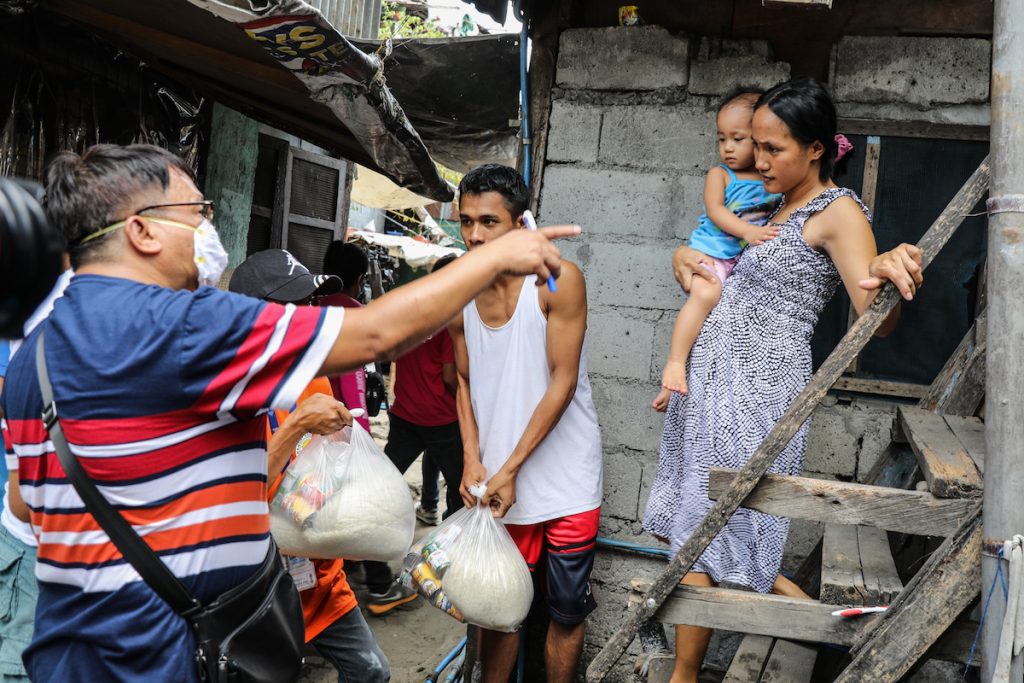The ad hoc body that’s in charge of Philippine government efforts to address the COVID-19 pandemic is likely to propose the extension of the “enhanced community quarantine” or lockdown of Metro Manila for at least another two weeks after April 14, when the original deadline expires.
An extended lockdown now up for consideration by the Inter-Agency Task Force for the Management of Emerging Infectious Diseases has drawn broad support from various sectors in Philippine society.
But that is bad news especially for the urban poor and ordinary workers unable to feed their families because they will have no income under the “no-work, no-pay” policy of some employers in the private sector and even in government.
Lawmakers and business groups grudgingly concede that an extension of the lockdown is necessary as the health crisis has yet to dissipate in the absence of a vaccine that would prevent the spread of the disease.
Vice President Leni Robredo has indicated that she supports an extension of the quarantine but hastened to add that it is “crucial” for the government to explain to the people why it is necessary, and that assistance should be expedited.
A group of prominent economists under the Foundation for Economic Freedom, whose advocacy is good economic governance and market-friendly reforms, wants the government to end the Luzon-wide lockdown as originally scheduled and henceforth shift to “calibrated easing.”
The group explained that certain restrictions imposed on the movement of people and commerce are “having a harmful effect on people’s livelihoods and ultimately also endanger public health.
“It suggests a long laundry list for the calibrated easing, such as mandatory use of face masks for all; mandatory social distancing; resumption of public transport with disinfection measures before and after every trip; removal of checkpoints between local government units and allowing free movement of all goods; allowing factories and offices to reopen but continuing the ban on congregations of more than 10; and where and whenever possible, do mass testing or random testing to give valuable data for decision points.”
Church officials also support an extended lockdown.
Bishop Broderick Pabillo, the apostolic administrator of the Archdiocese of Manila, believes that the decision to lift or extend the lockdown should be decided according to “medical evidence.”
For his part, Bishop Oscar Florencio, vice chairman of the Episcopal Commission on Health Care of the Catholic Bishops Conference of the Philippines, opines that the government should decide on the matter because “they know better.”
The national government is already implementing a special law that authorizes President Duterte to exercise powers necessary to address the health emergency. Among its salient features is the reallocation of almost 275 billion pesos, about US$5.4 billion, from the estimated 438 billion-peso (US$8.5 billion) national budget this year to finance a social amelioration program aimed at providing much-needed help to the poor.

Poor families are now bearing the brunt of the near-total lockdown of the country as they cannot earn their keep with the stay-at-home directive of authorities. While the government has decreed that poor families would receive P8,000 ($187) a month for two months, an extended lockdown for another two weeks or even a month would push them deeper into more economic hardship.
The National Economic Development Authority has projected that gross domestic product this year could register negative growth of 0.6 percent to an expansion of 4.3 percent, depending on how long the lockdown of Luzon will last.
That projection is shared by the central bank, which said the novel coronavirus pandemic would have a longer and more disruptive impact on the economy and lead to sluggish growth for the rest of 2020.
The coronavirus outbreak would likely lead to a P91 billion (US$1.8 billion) reduction in tax collections, but the Department of Finance said slower economic activity would pull down government revenues for 2020.
From another direction, the Asian Development Bank sees the Philippine economy still growing this year by a slower 2 percent. But it also warned that “economic recovery may lag if its engines — the supply chain, businesses, and their workforce—cannot be jumpstarted as soon as possible.”
The World Bank sees the COVID-19 pandemic hurting the poor the most, “both directly through illness and indirectly through lost incomes.”
Dark times ahead, for sure, but also enough indications — and hope — that there’s light at the end of the tunnel.
Ernesto M. Hilario writes on political and social justice issues for various publications in the Philippines. The views and opinions expressed in this article are those of the author and do not necessarily reflect the official editorial position of LiCAS.news.








